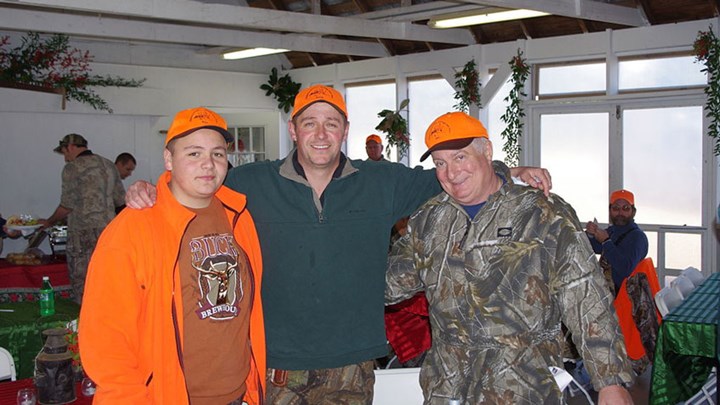
by Ron Spomer - Tuesday, June 18, 2019

Forty years ago when I worked for a state fish and game agency, there were jobs for biologists, game wardens, statisticians, licensing agents, education and information specialists, and secretaries. But a hunter recruitment officer?
Hunter recruitment is now a job description. State fish and game agencies are advertising for hunter recruitment specialists. If you take the term literally, it means “person who entices more people to become hunters.” Are they kidding me? They want to create more demand for the declining number of big game tags you and I are already fighting over? And they want us to pay for it?
Wait a minute. Let me get this straight. Via my hunting license and tag fees plus the excise taxes I pay for guns and ammo, I pay to support my state fish and game agency so it can monitor wildlife, balance the harvest, research and cure diseases, reintroduce species, restore habitat and stop poaching. Right? Right. And that’s great because over the past half-century this system has made it possible for me to enjoy several months of open hunting seasons each year. I’ve had the thrill and joy of tracking, spotting, stalking, shooting and eating whitetails, mule deer, elk, pronghorns, moose, sheep, bears, goats, turkeys, grouse, pheasants, partridges, rabbits, squirrels and waterfowl. So far, so good, but…
With ever more humans demanding ever more highways, houses, shopping malls, playgrounds and crop fields, wildlife habitat is declining. Hunting seasons have been growing shorter. Tags have become harder to draw. And now states’ fish and game agencies are using my money to fire up, entice and recruit more hunters?
To that I say hallelujah! Rejoice! Hiring hunter recruitment officers to focus on adding more hunters to our ranks is a good thing. Not because any of us wants more competition for bucks and birds, but because bucks and birds need more friends. Passionate friends. True friends. The kind of friends sport hunters have been for well over 100 years. Wildlife and wild places need hunters who fight and lobby and sweat to save and restore grasslands, woodlands and wetlands. Wildlife needs alert hunters who spot land abuse and pollution and raise the alarm. Wild places need hunters who put money where their mouths are, paying literally billions of dollars to benefit wildlife. Wildlife does not need more people spending millions on advertising to protest humankind’s involvement in the natural cycle of life. Wildlife needs involved, hands-on hunters who interact, support, defend, augment and sustain the wild, natural cycle of life.
Sadly, the percentage of citizens who really care for the wildlife, who know, love and interact with real Nature instead of televised Nature, is declining even as the general population is growing. The number of people who hunt is dropping—steadily and rapidly. And that means funding for our impressively successful North American Model of Wildlife Conservation is drying up. Without hunters to buy licenses, tags, shotguns, rifles, ammunition, scopes and other outdoor gear that is taxed to raise money for wildlife management, wildlife loses. Biologists go away. Disease research declines. Habitat protection and enhancement stops. Game wardens become city cops—and poachers breathe easier.
And that’s why we need to use some of our hunting-license dollars to hire hunter recruitment officers. We current hunters and the wild animals we love need additional hunters for their monetary contributions. But we also need them for their political support. As our burgeoning population becomes more and more urban and isolated from Nature, it becomes easier to brainwash folks with the false narrative of the anti-hunting movement. When people hunt, when they become intimately involved with Nature, spending hours, days, and weeks each year hearing the silence of the wind in the pines, watching skeins of migrating mallards whiffle into a “fetid swamp,” hearing coyotes howl over the frantic cries of a captured fawn… they get it. When people escape their digital screens and taste real Nature, they begin to understand the critical importance of sustainable use of native plants and animals. Once they shoot, prepare and eat a rabbit or grouse, they truly appreciate their connection to the world. Not the human-made world of concrete and silicon, but Nature’s world of growth, death and rebirth.
This is the ethos we must recruit, the spirit we must foster. Hunting is an essential part of the land ethic that wildlife conservationist Aldo Leupold tried to teach. It may seem a sad dichotomy that to save the wild we need more of what is destroying the wild—humans.
Trust me, I don’t want more hunters competing for our limited supply of deer tags. But I’m willing to share and to sacrifice in order to gain soldiers for our fight. Because if hunter numbers dwindle, wildlife numbers dwindle. Until we as a species come to grips with the reality that the wild world is a finite place, we’ll all have to sacrifice more as we share more.
The job of saving hunting is the job of saving the wild.
About the author:
Award-winning outdoor writer and contributor Ron Spomer says hunting is everyone's way of connecting with true freedom—the freedom to interact with Earth as naturally as does a wolf, falcon or chickadee. During more than 50 seasons afield, Spomer has decades of hunting experience and writes regularly for multiple outdoor publications, including NRA Publications, sharing his vast knowledge on guns, ammo, optics and gear. For more information, including his top hunting tips and tactics, visit his website, Ron Spomer Outdoors.
Follow NRA Hunters' Leadership Forum on Twitter @HuntersLead.
E-mail your comments/questions about this site to:
[email protected]
Proudly supported by The NRA Foundation and Friends of NRA fundraising.
